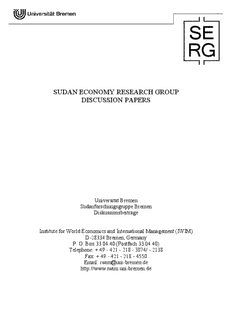
Poverty Alleviation via Islamic Banking Finance to Micro-Enterprises in Sudan: Some lessons for ... PDF
Preview Poverty Alleviation via Islamic Banking Finance to Micro-Enterprises in Sudan: Some lessons for ...
SE RG SUDAN ECONOMY RESEARCH GROUP DISCUSSION PAPERS Universität Bremen Sudanforschungsgruppe Bremen Diskussionsbeiträge Institute for World Economics and International Management (IWIM) D-28334 Bremen, Germany P. O. Box 33 04 40 (Postfach 33 04 40) Telephone: + 49 - 421 - 218 - 3074/ - 2138 Fax: + 49 - 421 - 218 - 4550 Email: [email protected] http://www.iwim.uni-bremen.de Sudan Economy Research Group Discussion Paper No. 35 Editors: Karl Wohlmuth Tobias Knedlik Professor of Economics, Research Fellow, University of Bremen University of Bremen Email: [email protected] Email: [email protected] Poverty Alleviation via Islamic Banking Finance to Micro-Enterprises (MEs) in Sudan: Some lessons for poor countries. By: Dr. Badr-El-Din A. Ibrahim, Sudan Economy Research Group, University of Bremen, Germany and Economic Ad- visor to the Undersecretary for Financial Affairs, Ministry of Finance, Muscat, Sultanate of Oman. Bremen, March 2003. Poverty Alleviation via Islamic Banking Finance to Micro-Enterprises (MEs) in Sudan: Some lessons for poor countries. Badr-El-Din A. Ibrahim TABLE OF CONTENTS Page: List of Abbreviations 2 Abstract 3 1. Introduction 5 2. Islamic Finance, Micro-enterprises and Poverty Alleviation 6 3. Islamic Mode of Finance and MEs 9 4. Financing Policies and MEs 16 4.1 The Bank of Sudan Financing Policies and MEs 16 4.2 National Financing Policies and Regulations 20 5. The experience of Sudanese Islamic banks in financing MEs 21 5.1 The Sudanese Islamic Bank 21 5.2 Faisal Islamic Bank of Sudan (FIBS) 24 5.3 Islamic Co-operative Development Bank (ICDB) 25 5.4 Nelein Industrial Development Bank Group (NDBG) 26 5.5 The Agricultural Bank of Sudan (ABS) 26 5.6 Farmer’s Bank (FB) 27 5.7 The Savings and Social Development Bank (SSDB) 27 5.8 Evaluation of the Sudanese Banking Experience in Financing MEs 28 5.9 Applications Constraints and Suggested Modifications 30 6. Islamic Finance and Poverty Alleviation 33 7. Conclusion and policy recommendations 39 Bibliography 41 2 List of Abbreviations: ABS Agricultural Bank of Sudan FB Farmer’s Bank (Sudan) FES Friedrich Ebert Stiftung (Foundation) FIB Faisal Islamic Bank GDP Gross Domestic Product ICDB Islamic Co-operative Development Bank (Sudan) IMSA Imputed Market Share Approach LDACs Least Developed Arab Countries MEs Microenterprises NGOS Non-Governmental Organizations NIDBG Nelein Industrial Development Bank Group PFBs Productive Families Branches (of the Sudanese Islamic Bank, Sudan) PLS Profit and Loss Sharing SIB Sudanese Islamic Bank (Sudan) SMEs Small and Micro-Enterprises SSDB Saving and Social Development Bank (Sudan). UNDP United Nations Development Programme. 3 Abstract of “Poverty Alleviation via Islamic Banking Finance to Micro-Enterprises (MEs) in Sudan: Some lessons for poor countries” There is no doubt that poverty in Sudan is wide. The question arises: what the Suda- nese Islamic banking can offer to mitigate poverty? The answer requires an investigation of the following hypotheses: 1. First, we hypothesise that efforts were made by commercial banks in Sudan to en- hance funding to micro-enterprises (MEs) for poverty alleviation, but national and internal policies of commercial banks have defeated this. 2. Secondly, we hypothesise that the Sudanese Islamic banking finance to MEs cannot be considered effective for poverty mitigation, given its deterrents characteristics such as un- stable and high share of resources (demand deposits), weak financial resources, relatively low lending capacity, regional inequality in the distribution of banking branches, sectoral concen- tration of investment and the bias toward the high profitable institutions in the modern sector at the expense of small sector. Although we reach the conclusion that the Sudanese experience of financing MEs to be ineffective as a mechanism to alleviate absolute poverty, the experience is postulated to be capable of offering some lessons for MEs financing, and mitigate some of the constraints raised in the literature. Here we are running for some aspects of the Islamic financing system that can be used to overcome some problems of small enterprises financing. There seems to be an advantage that Islamic partnerships can offer to MEs’ financing. If profit and loss shar- ing formulae are taken as one form of venture capital, rather than an ideological concept, it will possibly have a great deal of universal application. Among other advantages, we argue, the use of profit and loss (PLS) financing, extension of financing facilities via specialised geographically scattered branches, innovative approaches of guarantees etc. The Islamic prin- ciple, we argue, could be taken by a banking system in the POOR region to help in poverty alleviation. The most important lesson from the Sudanese experience might be that profit and loss sharing (PLS) formulae and mark-up financing techniques are useful in solving out- standing constraints in MEs’ financing. One of the features of Islamic PLS experiences that will be analysed is that failed small business, through no fault of their own, under this system of finance, may not end up being worse-off than if they had never borrowed. Owners of failed MEs are not burdened by repayment.
Description: